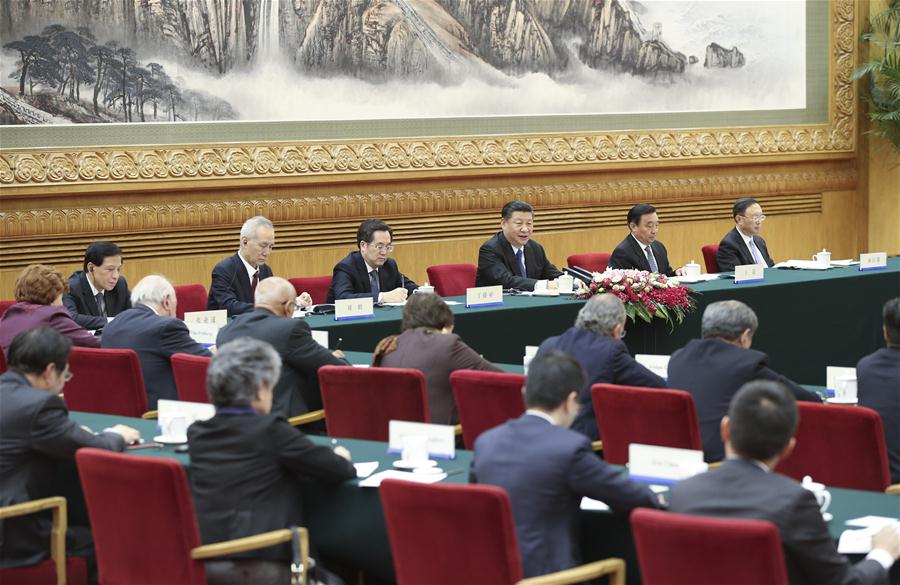
Chinese President Xi Jinping (3rd R rear) meets with foreign delegates attending the 2017 Imperial Springs International Forum in Beijing, capital of China, Nov. 30, 2017. (Xinhua/Yao Dawei)
BEIJING, Nov. 30 (Xinhua) -- Chinese President Xi Jinping said here on Thursday that Chinese diplomacy in the new era is to promote the construction of a new type of international relations and a community of shared future.
Xi made the remarks when meeting with foreign delegates to the 2017 Imperial Springs International Forum from Tuesday to Thursday.
Former world leaders, renowned scholars and business elites gathered in China's southern city of Guangzhou to exchange their views on global governance.
A new type of international relations mean countries need to uphold mutual respect, fairness and justice and win-win cooperation, abandon law of the jungle, promote dialogue and partnership instead of confrontation and alliances, Xi said.
A community of shared future will bring lasting peace, universal security, common prosperity, openness and inclusiveness as well as a clean and beautiful world, he said.
"As a country of over 1.3 billion people, China contributes to the construction of a community of shared future by maintaining its own long-term stability and development," Xi said.
He said China will always follow the peaceful development path and will never seek hegemony like great powers did, adding that China's cooperation with other countries is never attached with strings to interfere with their domestic affairs.
China will take a more active posture in global governance, including facilitating the political settlement of international issues, participating in UN peacekeeping missions, implementing the Paris Agreement and the 2030 Agenda for Sustainable Development, Xi said.
"Our development path of socialism with Chinese characteristics is the choice of history and people. China's historic achievement has consolidated our confidence in the path," Xi said.
Since the founding of People's Republic of China in 1949, especially since the reform and opening-up in 1978, China has undergone great changes. It has become the second largest economy in the world and improved the lives of more than 1.3 billion people, getting 700 million people out of poverty.
"Socialism with Chinese characteristics has entered a new era," Xi told the delegates.
He explained the country's task is to satisfy people's increasing needs on many fronts and China wants to turn itself into a great modern socialist country that is prosperous, strong, democratic, culturally advanced, harmonious, and beautiful by 2050.
The 19th National Congress of the Communist Party of China set guidelines for China's development in politics, culture, society and environment, Xi noted.
China will put people at the center, carry out comprehensive reform and open up further, he said.
"Our goal is lofty as well as simple, and ultimately, we want all the Chinese to live a better life," the president said.
"China advocates a country's development path should be decided by its people and there is no one-size-fits-all model," Xi said, adding that China is willing to share national governance experiences with other countries.
Foreign dignitaries said China in the new era will bring more benefits to the world, as the country has shown leadership in global economy and promoting a multi-polar world.
They applauded China's efforts in making globalization more balanced and inclusive, its commitment to international partnership in addressing climate change and its assistance to developing countries.
The China-proposed Belt and Road Initiative and the Asian Infrastructure Investment Bank offer more opportunities for other parties to work with China, they said.
Former Latvian President Vaira Vike-Freiberga, former Italian Prime Minister Romano Prodi, former Nigerian President Olusegun Obasanjo, former UN Secretary-General Ban Ki-moon, former Japanese Prime Minister Yokio Hatoyama and others were present at the meeting.



